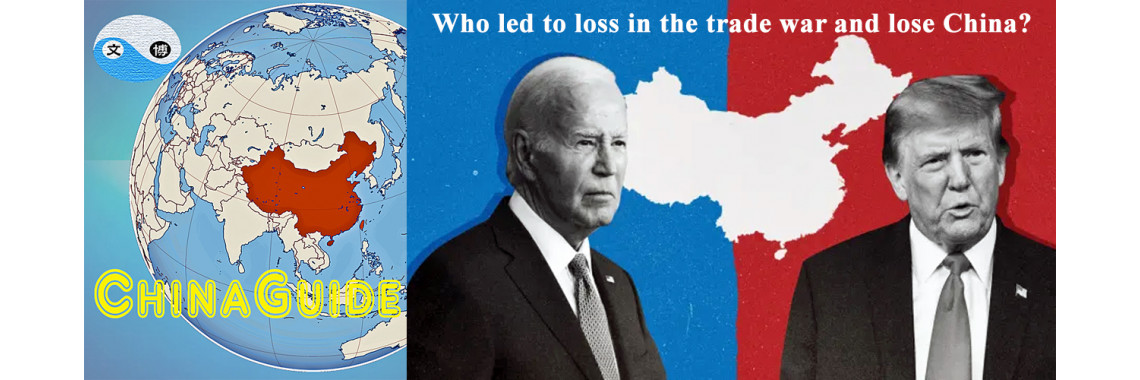China prepares the upcoming American's Trade War 2.0

By Wenwen WANG - 21/11/2024 - 0 comments
An economic conflict between China and the United States has been ongoing since January 2018, when U.S. President Donald Trump began setting tariffs and other trade barriers on China with the goal of forcing it to make changes to what the U.S. says are longstanding unfair trade practices and intellectual property theft. The Trump administration imposed several rounds of tariffs on steel, aluminum, washing machines, solar panels, and goods from China, affecting more than $380 billion worth of trade at the time of implementation and amounting to a tax increase of nearly $80 billion.
The Trump administration added 216 Chinese persons to the Specially Designated Nationals and Blocked Persons (SDN) List and 259 Chinese persons to the Entity List.
The Biden administration has maintained most tariffs, except for the expiration of the tariffs on washing machines after a two-year extension.
In May 2024, the Biden administration announced additional tariffs on $18 billion of Chinese goods for a tax increase of $3.6 billion. May 14, the Biden administration doubled tariffs on solar cells imported from China and more than tripled tariffs on lithium-ion electric vehicle batteries imported from China. It also raised tariffs on imports of Chinese steel, aluminum, and medical equipment. The tariff increases will be phased in over a period of three years.
US shifts from 'decoupling' to 'small yard, high fence' on China. the Biden administration has further intensified trade tensions culminating in a trade war and sanctions on Chinese technology companies.
The Democratic administration has introduced a number of new export limits and US investment bans for Chinese companies to protect US economic and military interests. In October 2022, the US Department of Commerce expanded sanctions after implicating 50 Chinese companies, including telecoms equipment maker Huawei in June 2021. Export controls were also introduced for chip maker Nvidia, Yangtze Memory Technologies (YMTC) and ChangXin Memory Technologies. Sanctions were expanded to include Chinese companies such as drone maker DJI and genomics company BGI Genomics, among others. South Korean telecom companies trading with the PRC were partially excluded from the new restrictions.
On 29 March 2024, the Biden administration revised rules aimed at restricting China's access to U.S. artificial intelligence (AI) chips and chipmaking tools, including those from Nvidia, as part of efforts to address national security concerns over Beijing's tech advancements potentially aiding its military.
The Biden administration added 432 Chinese persons to the SDN List and 412 Chinese persons to the Entity List as of August 30, 2024.
On October 28, the US Treasury Department issued final rules on investment restrictions against China, targeting sectors such as semiconductors, artificial intelligence, and quantum computing. These rules aim to prevent U.S. investments from advancing technologies that could pose national security threats.
November 13, 2024, US Advisory Panel recommends Repealing China’s Preferential Trade Status.
President-Elect Trump has promised to take a strong stance on China. He plans to revoke China's Most Favored Nation trade status, attain economic independence from China and prevent China from buying American real estate.
President-Elect Trump has said he will increase tariffs on foreign countries, arguing that raising tariffs and implementing universal baseline tariffs, coupled with lowering domestic taxes, will make America a manufacturing powerhouse again.
"Tariff Man," he called himself. This time, he’s gone much further proposing a 60% tariff on goods from China — and a tariff of up to 20% on everything else the United States imports.
PBS News: Biden meets with China's Xi for final time on sidelines of APEC summit
龙哥时评:敌退我进顺势而为,中美主战场在亚非拉!
China to cancel or cut export tax rebates for various products
Updated: November 15, 2024 21:32 Xinhua
BEIJING, Nov. 15 -- China announced on Friday that it will change export tax rebates for a range of products, effective from Dec. 1.
The announcement, jointly issued by the Ministry of Finance and the State Taxation Administration, said that export tax rebates for aluminum, copper and chemically modified animal, plant or microbial oils and fats will be cancelled.
Meanwhile, the export tax rebate rate for some refined oil products, photovoltaic products, batteries and certain non-metallic mineral products will be reduced from 13 percent to 9 percent.
China targets critical metal exports in anticipation of further US tech, trade curbs
China releases export control list(2024-11-18)
Beijing will expand export controls on critical minerals like tungsten, graphite, and magnesium needed to make electronics, a move analysts say is in anticipation of expected sweeping US tariffs on Chinese goods and increased curbs on advanced semiconductor chips and AI technology to China following the re-election of US President Donald Trump.
The restrictions also apply to specific technologies that can be used for both civilian and military purposes.
China controls more than 80% of the world’s supply of tungsten and about 90% of global magnesium production, according to one official estimate; the minerals are indispensable in building defense technology, weapons, aviation equipment, and spacecraft.
Washington has pushed to delink the supply chain from China by sourcing from other countries, primarily Latin America. But Beijing’s current export controls on critical minerals don’t appear to have significantly decreased their trade with the US, according to one analysis, while US export controls on semiconductors also don’t appear to be stopping big Chinese firms like Huawei from accessing cutting-edge technologies, The Washington Post reported.
川普的美国制造业振兴之路,充满挑战
本视频深入探讨了美国制造业的现状与未来,以及振兴之路上面临的挑战。从美国大选结束后的制造业话题切入,回顾了懂王(特朗普)上台后振兴美国老工业基地的努力,以及当前拜登政府连续通过多项法案试图推动制造业回流的情况。然而,通过世界银行数据和联合国报告的分析,揭示了美国制造业正在衰退的严峻事实。
视频进一步剖析了美国制造业企业数量减少、就业岗位下降、薪资增长滞后等具体问题,并指出劳动力短缺和劳动市场扭曲的现状。同时,探讨了关税政策对制造业的负面影响,以及为什么简单的减税和补贴政策并不能有效振兴制造业。
在反思部分,视频提出了美国需要一个长期战略和全面的产业政策,而不是仅仅依赖减税和补贴。通过对比中国的产业政策,指出了美国在大公司对政府游说和补贴分配上存在的问题,以及中国国有企业和高校在降低企业成本、推动创新方面的独特优势。
本视频旨在引发观众对美国制造业未来发展方向的深入思考,为关心美国经济、制造业发展的观众提供了有价值的参考和启示。
杨风时评: 給川普提醒 中國發佈 出口管制清單 (2024-11-18)
Tags: US sanctions, Entity list, trade war, tariffs
Featured
Blood Tonic Syrup
naturally relieving anemia and irregular menstruation. It helps women, blood loss recovery, the elde..
Hair Health (Wu Xu Sheng Fa Su) 72 Pills x 12
Used for premature grey hair, early white hair, thinning, dry hair, alopecia areata and hair loss af..
Vitality Plus Formula 20 cps x 6
helps restore and enhance your masculine energy, promotes sexual vigor and performance naturally. Ch..
Everyday Chinese 900 with Audio Pen -Spanish Version
Authentic language for real-life communication! Everyday Chinese enables beginning foreign learners ..













Comments
Write a comment